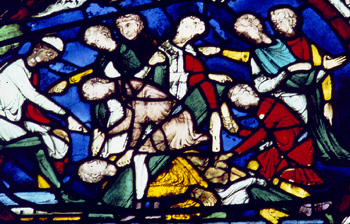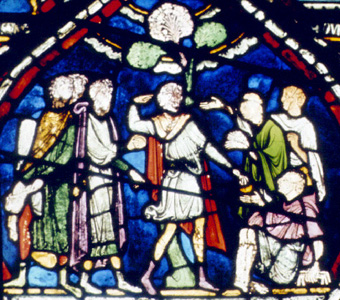Eilward of Westoning

The punishment of Eilward
Few would think of a link between Westoning and Canterbury Cathedral but there is one. The Archaeological Journal of March 1876 carries an article by W. J. Loftie on the early stained glass in the cathedral [CRT130Westoning4]. Loftie began: "It is but fitting that the oldest, and perhaps I may add the best, stained glass in England should be found in Canterbury Cathedral". He moves on to describe the windows in the Trinity Chapel devoted to the cult of Saint Thomas Becket, the Archbishop of Canterbury and Chancellor of England murdered in the cathedral by four knights on 29th December 1170, thinking they were doing the bidding of King Henry II (1154-1189), once Becket's friend who is said to have uttered the famous phrase "Who will rob me of this turbulent priest?". The connection is that two windows depict a miracle centred around a man named Eilward of Westoning which presumably happened in the early years of the 13th century. The story is set out by Loftie as follows:
"The third compartment relates to a curious story, and one which well illustrates the manners of the age. It is related in more than one of the books [medieval compilations of the miracles attributed to Becket following his murder], and must have been extensively believed.A certain man at Dunstable, according to one version - at Weston [the early name for Westoning], "a royal town" according to another [presumably referring to the manor being a royal manor], - but as both say, in Bedfordshire, bore the name of Eilward, and had among his neighbours one named Fulk, to whom he owed 2d. for the ploughing of half an acre of land. It happened on a certain festival after the passion of the blessed martyr [i. e. Becket], - so we read - that these two men, Eilward and Fulk, debtor and creditor, went together by chance to the same tavern, "for", says the narrator, "it is the custom of the English on holy days to indulge in feasting and drunkenness, so that their enemies see them and deride their Sabbaths." These two, then, seem to have been not only no better than their neighbours, but no better, or worse, in this respect than Englishmen at the present day, after the lapse of six hundred years. They began to dispute about the debt, one denying that he owed it, and the other offering to let him pay off a part if he would spend it in beer. Indeed, if the names were changed, the dispute, which is given at some length, would fit exactly to what is repeated in our police courts every Easter and Christmas, or oftener. Eilward leaves the tavern first, and smarting under the taunts of his creditor, goes to Fulk's house, breaks in the door, and in a blind drunken kind of way seeks what he may destroy. A pair of gloves, such are used to this day, for hedging and a whetstone are all he can find. The children of Fulk, who are playing in the hall, run out to call their father. He comes in haste, and meeting Eilward at the door, seizes from him the whetstone, and at once, as we read, "breaks the whetstone on his head, and his head on the whetstone". He then fetches the parish beadle, or, as we would say, the constable, in Latin "praeco", whose name is also Fulk, which, by the way, adds an element of great confusion to the story, and Eilward, lying drunk and with his head broken, is speedily apprehended and lodged in gaol at Bedford. He protests his innocence at any design of robbing Fulk; but, though he calls loudly on St. Thomas and the other Saints, he only secures thereby the interest of an old priest of his village, and of the prior of Bedford, or according to the other account, of Dunstable, whose name is Geoffrey [the first known Vicar of Westoning is a William in 1245; a Geoffrey de Barthon was Prior of Dunstable in 1241 but this is too late for the story - see below]; they both support him with food in prison, and confirm him in his faith in the intervention of the martyr, and especially, says one account, because he had been baptised on the Eve of Pentecost. Geoffrey is adduced by the narrator in witness of the truth of the story. At length the time arrives for the trial, and Eilward, taken before the sheriff - vice-comes (at Leighton Buzzard?) - fails to clear himself, and refusing to submit to the ordeal of battle with Fulk, and being forbidden that of fire, which he desired, owing to the intervention of the other Fulk, who had been bribed, he is tried by water, "from which he could not escape", as we read, and he is then condemned. Being dragged to the place of execution his eyes are plucked out, and he is otherwise mutilated [Loftie's Victorian sensibilities prevented him from saying that Eilward was castrated], as appears in the window, where we see him lying on his back, at the feet of the Judge, while, as the narrator tells us very minutely, "his left eye is pulled out bodily, and the right eye is lacerated and in part cut in two, but not altogether dug out - (effosus)". Then, the parts thus cut out having been buried under the sod, he is left half dead. Eilbrictus, a householder of the town, takes pity on him and receives him into his house. There he remains for some days, praying earnestly. There comes to hi mat length a vision of angels by whom he is desired to address himself in particular to the Blessed Virgin and St. Thomas of Canterbury. According to William, he is visited by St. Thomas himself, who touched his eyes with his staff, as represented in the window. At length, to the surprise of himself and all the neighbours, he begins to be conscious of returning sight, and his eyes, "the pupils half hidden", as we read, "in his head, hardly as large as the eyes of a little bird", are gradually restored, as well as the other losses he had suffered at the hands of the executioner, and he stands whole and well in the presence of many witnesses as shown in the lower compartment of the picture. William vouches for the truth of the story, and adds that Eilward became a pensioner at Canterbury. As the ordeal was condemned by the Council of the Lateran in 1214, this story maybe dated in the early years of the century".
 The cure of Eilward
The cure of Eilward